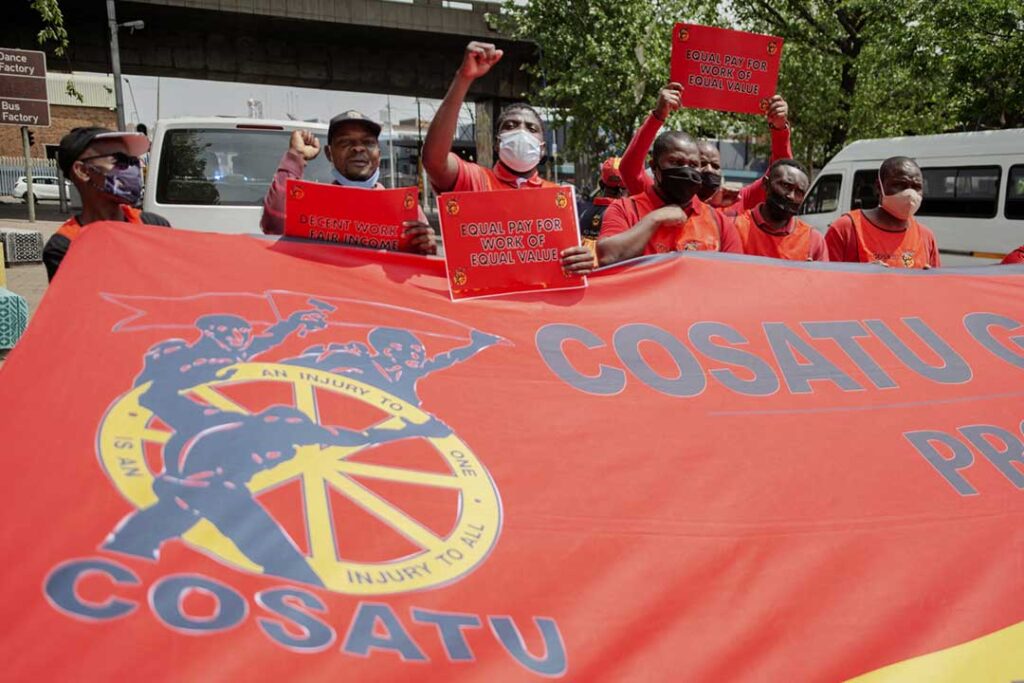Labour unions and the free market
Capitalists and labour unions are often seen as adversaries, but they have more in common than either side imagines

Yasuyoshi CHIBA / AFP
By Ivo Vegter
Most labour unions lean strongly towards the left. They consist overwhelmingly of working-class members, so ideas such as mandatory minimum wages, taxes on the rich and elaborate health and safety regulations suit their objectives. Unions oppose the capitalist captains of industry who are caricatured as soulless, greedy, and out to exploit ordinary workers. The central idea of socialism the labour theory of value is the creed of most labour unions. They believe, as did Marx, that extracting value from workers is how companies make a profit. In Africa, socialism is even more deeply ingrained in union movements than in the capitalist West. This is particularly true in South Africa, because of the alliances forged during the liberation struggle. Unions believe that it is government’s duty to promote the interests of workers.
This is no different from companies that argue for laws they call “business-friendly”, but which are really designed to protect their vested interests against competitors, customers or employees. Being pro-business or pro-labour are not the only possible positions on union matters. When advocates of freedom support business, this is not evidence of hostility towards organised labour, just as support for union objectives does not necessarily imply antipathy towards business. Free-market capitalists believe freedom is good for everyone; and laws favouring one group over another are inherently unjust. They do not seek to prohibit workers from organising in their own self-interest. On the contrary—free association is a fundamental right of free individuals. How, then, do free-marketeers envisage the role of labour unions? During the Industrial Revolution, British workers were routinely denied freedom of movement or the right to own property.
Exclusive licences and charters gave companies the power to crush competitors. The Master and Servant Law turned employees into virtual serfs, unable to break employment contracts even when employers were abusive. Later laws, known as the Combination Acts of 1799 and 1800, prohibited worker organisation and strike action. Violators were punished with prison, hard labour or transport to penal colonies. Starting in 1811, Luddite workers staged violent protests against factory conditions, forcing the British government to repeal the Combination Acts. But official policy continued to favour employers at the expense of employees. Consider the fate of the Tolpuddle Martyrs, six farmworkers who formed a union in a small English town in Dorset in 1834. When it emerged that they had sworn an oath of loyalty to the union, they were arrested on the grounds that secret oaths were illegal and shipped to Australia.
Contemporary hostility towards capitalism gives the impression that this sort of coercion was acceptable to free marketeers. Nothing could be further from the truth. The unholy alliance between government and industry stifled competition, crippled companies, drove consumer prices upwards and made workers’ lives miserable. That is why early apostles of free markets backed campaigns for worker rights, including the right to organise unions and bargain freely with employers. But they did not want to see all power swing towards workers. Their position was philosophically neutral; they wanted government to scrap laws that benefited rich industrialists, and legislate independently of special interests on either side. If all exchanges in a market are to be free of force or fraud, the same ought to be true for the exchange of labour. The right to strike in response to contractual grievances is important. But given too much legal protection, strikes become tools of blackmail and coercion.
Employers should be free to call the workers’ bluff on unreasonable demands, and to replace striking workers if they refuse a fair settlement. In this respect, South Africa falls far short of the free market ideal. Indeed, the South African Institute of International Affairs, a Johannesburg think-tank, argues that the country’s political and legal framework “creates incentives that favour violence and unprotected strikes over cooperation”. Free market advocates also oppose so-called “closed shops” laws, under which all workers in a company can be required to become paid members of a single union. In South Africa, for example, the law permits a closed shop to be formed if two-thirds of workers agree. Workers who refuse to join the union must be dismissed, and such a dismissal is not considered unfair. If only half the workers agree, a union can enter into an “agency shop” agreement, which obliges the employer to withhold union fees from the wages of non-member employees, without their consent, on the grounds that they, too, benefit from the union’s collective bargaining efforts.
These statutes played a role in the run-up to the August 2012 Marikana massacre. The rock drillers at Lonmin’s Marikana mine were members of the dominant National Union of Mineworkers (NUM). They had become alienated, allegedly, because management had co-opted NUM shop stewards. Many rock drillers concluded that the upstart Association of Mineworkers and Construction Union (AMCU) would better serve their interests. But closed-shop rules forbade AMCU from representing them. To add insult to injury, financially strained rock drillers were forced to continue paying a percentage of their wages to a union they no longer supported. And when they marched on NUM offices to protest, they were shot at. Within days, the mine had become a cauldron of violence, culminating in the shooting of 34 workers by police. In a free market system, the minority union would have had the right to enter Marikana’s de-facto closed shop once it had demonstrated significant support among the workforce.
And workers would have had the right to stop paying dues to a union whose officers had lost its confidence. Labour leaders resist such reforms because they weaken union power. In a way, this is true; employers value competition among workers because the threat of replacement reduces their cost and increases their productivity. Workers do not appreciate this pressure, and continually seek to use union power to gain the upper hand in wage negotiations, or to establish artificial job security against heavy competition from the unemployed. The effects of union power go well beyond employees in a unionised company. For example, textile firms in Newcastle, in Kwazulu-Natal, were offering employment at wages below those that the dominant industry union, the South African Clothing and Textile Workers’ Union, had agreed with established employers largely based in the Western Cape. The union attempted to use labour laws to have these competitors raise wages or shut down.
The ostensible cause was to demand a “decent, living wage” for the Newcastle workers, and the government joined the unions in a legal dispute with the offending firms. Although the Newcastle firms won the court case, the labour minister extended the wage agreement anyway. This is a clear violation of the principles of free competition among business rivals. These workers surely are happy to be paid more, but would also prefer their jobs to unemployment, which is rampant in the region. This is not only a question of employers’ rights versus workers’ rights. The rights of the unemployed are forgotten in this struggle, because they are voiceless. Labour laws that grant unions monopoly rights do not merely benefit workers, or harm employers. They entrench structural unemployment and chase industrial investment to countries where the law is more equitable. In 2002, Canada’s Fraser Institute’s Annual Survey of Mining Companies ranked South Africa as the 13th most desirable destination for mining investment out of 47.
The republic has since slid to number 64 out of 122 in 2014. When it comes to labour regulation, South Africa is now seen as one of the most hostile countries on the planet, with 38% of survey respondents saying that labour regulations and labour militancy are strong deterrents to investment. The reasons are glaring. A recent Global Competitiveness Report from the World Economic Forum ranks South Africa 113th in labour market efficiency, 143rd in hiring and firing practices and stone last—144th—in “significant tensions in labour-employer relations”. Ratings like these doom South Africa’s hopes for economic growth and significant job creation. Clearly, the time has come for leaders to take another look at free market theory and amend laws that grant monopoly rights and coercive powers to labour. Even with their wings clipped, unions would still play an important role. Some capitalists are indeed rapacious and would reduce workers to serfdom if they could.
Resistance is important, but not easy. Even well educated workers are at a disadvantage in wage negotiations because of a lack of information, insecurity or timidity. A union can play a crucial role by explaining what remuneration and benefits members are entitled to expect, and then using its collective muscle to secure those gains. Unions can also play an important role in establishing workers’ rights to health and safety, more vocational training and better retirement benefits. Success in these arenas would make union membership more attractive, and perhaps even check the decline in union membership. (The number of individuals registered with a trade union as a proportion of employed people declined from 31% in 1994 to 25% in 2014, according to the the South African Institute of Race Relations.) In a free-market economy, both companies and unions have every right to exist. Both contribute tremendous good to their shareholders and members, and to society at large. But neither side has the right to expect the government to take sides in the dynamic process of negotiation. As Marikana demonstrated, this only leads to conflict and violence.



